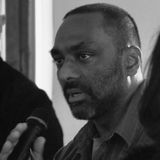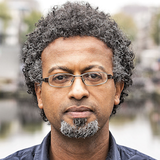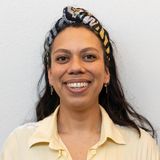In earlier episodes of Designing Cities for All, we have seen that design is everywhere, and everything around us is designed. We have also seen that there are flaws in these designs because what we tend to do in this world is design for the middle and forget about the margins. Wouldn’t we create and build stronger structures for everyone, when we design for the people who are actually living with the failures of our designed products, spaces, and systems?
Praveen Sewgobind is an activist-academic working to deepen and complicate Critical Race Theory with a decolonial lens, focusing on the embodiment of white racism and social constructs of racial formation in the Netherlands. In 2020, Praveen was appointed as a member of the research department of Design Academy Eindhoven. Furthermore, Praveen is a lecturer at the University of Amsterdam where he currently teaches a Netherlands Institute for Cultural Analysis course titled Decolonial Studies and Political Philosophy. As a Professor of Diversity and Inclusivity, he aims to contribute to dismantling exclusion by embracing structural diversity in the context of the city. Cities have traditionally been loci power and privilege, as well as sites where their unequal distribution has been contested and dismantled. How can we use diversity and inclusion as design tools to truly enable a sense of belonging?
Tanachia Ashikali’s expertise includes diversity management, leadership, and inclusion in public organisations, which are increasingly implementing interventions based on different diversity approaches aimed at promoting diversity and inclusion in the organisation. Tanachia researches how different approaches to diversity contribute to a sense of belonging, and develops and applies quantitative research methods and techniques to study these topics among employees and (team) leaders. Example applications include: developing and testing a measurement scale for inclusive leadership, using survey methods and structural equation modeling.
Nica Renoult’s mission is to create a level playing field for every job seeker and help companies with the creation of a more diverse and inclusive workspace. Together with Roos Aduagyei, Nica founded Trickle, a recruitment service for anonymous hiring. Unfortunately, not everyone gets the same opportunities when applying for a job. While we like to believe we don’t have any biases, only 5% of what we think and do is conscious – and with that a vast 95% unconscious. Nica will share how they redesigned the recruitment process striving for equal opportunities on the job market for everyone – regardless of background.
Fascinated by the endless opportunities artificial systems seemed to offer in the early 90s, Sennay Ghebreab choose a career in Artificial Intelligence (AI) to study neural systems (how does the human brain use physical patterns and biases to get a quick first impression of the natural environment) and social systems (how do humans use stereotypes as a mechanism to cope with the social environment). Combating inequality of opportunity is the common thread running throughout his career. Currently, he is a Professor of Socially-Intelligent AI and Program Director MSc Data Science & Information Systems. He is also the Scientific Director of the Civic AI Lab, in which AI technology is developed to increase equal opportunity in the fields of education, welfare, environment, mobility, and health.


IISC - In his TEDx talk, Ceasar McDowell explores how disconnections in narrative, communications, and design stand in the way of democracy and what today’s global social movements are doing to repair these connections. >>

Design Academy Eindhoven - 'The word 'diversity' distracts the attention from the real issue at hand, which is that there is an unequal distribution of resources.' >>

BNN Vara - Ruim de helft van de sollicitanten zegt ooit gediscrimineerd te zijn. Tijd voor een eerlijker, objectiever sollicitatieproces, vinden Nica Renoult en Roos Aduagyei van de anonieme vacaturebank Trickle. >>

Adobe XD - Our role as designers is to build better and more human-centered experiences that are inclusive of all people. >>
Sennay Ghebreab - Smart cars, smart homes, smart speakers: artificial intelligence (AI) mainly benefits people who already had the wind with them. How do we ensure that AI makes the world better for every citizen? >>











